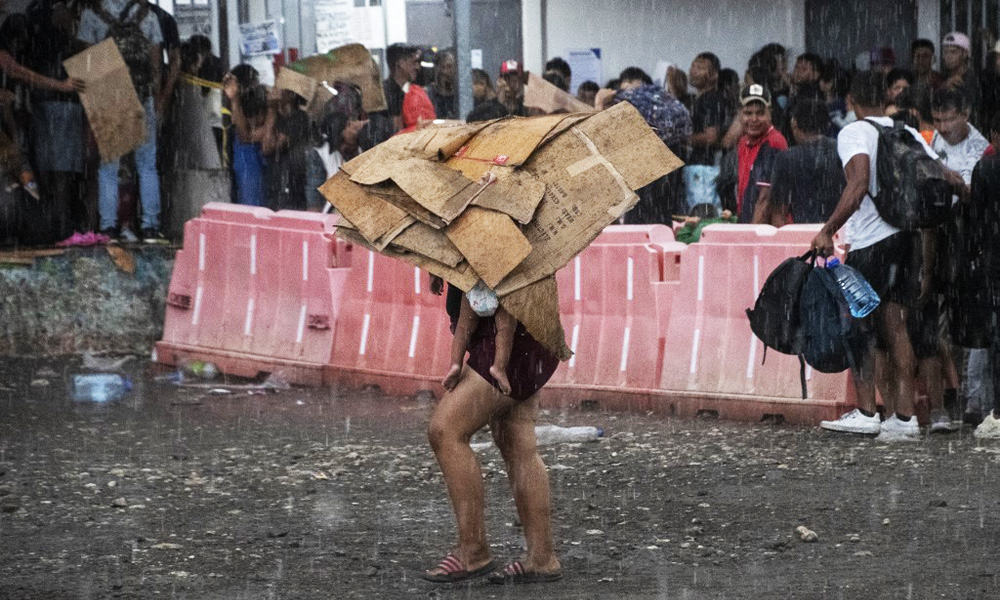A growing flow of migrants, many scourged by fever, vomiting and diarrhea, arrives every day in Paso Canoas, on the border between Costa Rica and Panama, after crossing the Darien jungle on the way to the United States.
Entire families cross the border with Panama on foot to the makeshift camp at an old airfield in Paso Canoas, 300 km south of San José, and arrive exhausted by the crossing, the sweltering heat and high humidity.
In this place, they take one of more than 50 buses, which cost $30 per passenger, to the border with Nicaragua. Those without money get stranded in land that with seasonal rains becomes a mud pit while waiting for money transfers.
Consequences of the Darien
The makeshift camp in Paso Canoas, set up by the Costa Rican government in May, is a purgatory for those stranded after crossing the Panamanian jungle.
“The hardest thing I’ve gone through in this whole journey has been the Darien jungle. It was very hard, to be honest, there was hunger, work, you see many things I never thought I’d see in my life,” said 18-year-old Venezuelan David Josué Díaz.
The scarce shade under a metal roof or tents is a privilege. In the mornings to protect themselves from the relentless sun and in the afternoon to escape the downpours. Hunger and digestive and respiratory diseases abound. A doctor from the NGO Cadena attends tirelessly every day.
“My belly hurts,” said 7-year-old Venezuelan boy Ángel, bent over on the muddy ground on a piece of cardboard. With fever and respiratory infection, his mother hopes the medicines will take effect, as they did with Samuel, who plays alongside him with a doll as he recovers from fever, vomiting and diarrhea.
Ángel still has the strength to joke about his trip while coughing ceaselessly. Other children in better condition play innocently on a swing, oblivious to the misery around them.
In the morning, stranded migrants pick up tents and clean the area so that new arrivals can find a place. Those who have food cook in pots inherited from previous migrants.
In town, adults stand in endless lines at the Western Union office waiting for the precious money to buy the ticket that will get them out of there.
National emergency
More than 400,000 migrants have entered Panama through the Darien in 2023, more than in all of last year, when there were 248,000, according to official Panamanian data.
Days later they arrive in Costa Rica in waves of 3,000 daily, according to Costa Rican Immigration. About 320,110 have entered Costa Rica in 2023, the vast majority Venezuelans.
“This situation warrants declaring a national emergency that the country is experiencing due to the number of people passing through our territory,” says a decree issued days ago by Costa Rican President Rodrigo Chaves.
Migrant center
The main change with the National Emergency is the opening, in weeks, of the Temporary Migrant Care Center (Catem), 11 km north of Paso Canoas.
Some 3,000 migrants will arrive directly to Catem from Panama on buses chartered by the Panamanian government instead of leaving them at the border as before and avoiding the misery of the border camp, which will be closed.
Some 300 migrants already inhabit Catem.
“The place already has adequate spaces for children’s activities, with medical care, dining rooms for people’s food,” said Elias Quesada, deputy director of Costa Rica’s Immigration Police.
The 38-year-old officer comments that Costa Rica is working with UN agencies such as UNICEF, UNHCR and IOM. “Here we have the ideal spaces,” Quesada comments as a dozen children watch the antics of the coyote and the roadrunner on a giant screen.
Some 200 officers will guard the premises 24 hours a day. Migrants with money to pay for buses to Nicaragua will continue their journey without delay. Those who do not have it, will be able to wait to get it in a covered facility, with rooms with bunk beds and mattresses for minors, the elderly or the sick.
They will have medical care and meals, showers and bathrooms, even a Western Union office, essential to receive money in the middle of the Costa Rican jungle.
Venezuelan Esmeralda Cuica said that she is grateful to be at Catem and not in Paso Canoas, where she stayed for several days before. “As for Paso Canoas, it’s really terrible, really difficult to be there, it’s every man for himself,” explains the 53-year-old preschool teacher.






